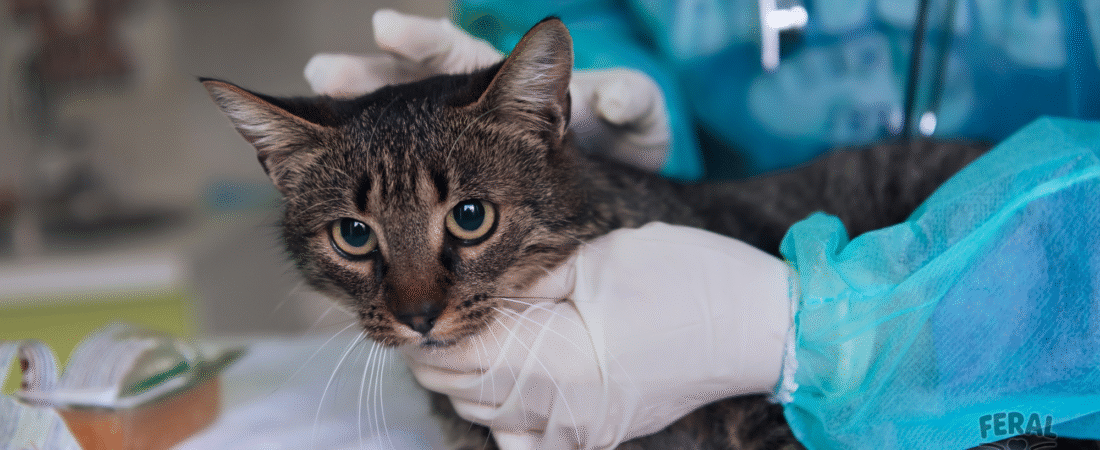📌 What Are Heartworms in Cats?
Heartworm disease (Dirofilaria immitis) is caused by parasitic worms transmitted by mosquito bites. Unlike intestinal worms, heartworms live in the heart, lungs, and blood vessels.
- In dogs: Worms grow into adults (up to 12 inches long), reproducing and living for years.
- In cats: Cats are not natural hosts — worms rarely grow into large numbers, but even one or two heartworms can cause severe illness or sudden death.
- Why they’re dangerous: Heartworms in cats can cause respiratory distress, heart failure, or sudden death without warning.
- Zoonotic risk: Humans are not affected by feline heartworm.
🦠 How Do Cats Get Heartworms?
- Mosquito bite: A mosquito carrying infective larvae bites a cat → larvae enter bloodstream → travel to heart and lungs.
- Outdoor cats = highest risk, but indoor cats are still vulnerable since mosquitoes easily come indoors.
- Geographic risk: Heartworm is most common in warm, humid, mosquito-heavy regions — but cases are found nearly everywhere.
🚨 Symptoms of Heartworm in Cats
Symptoms are broad and often overlap with asthma, pneumonia, or other lung issues, making them tricky to diagnose.
- Coughing and wheezing: Sometimes mistaken for asthma.
- Rapid/difficult breathing (dyspnea).
- Vomiting (unexplained).
- Weight loss + poor appetite.
- Lethargy, reduced activity.
- Collapse or sudden death: Possible with a small number of worms.
⚠️ Some cats show no obvious symptoms until sudden, fatal collapse occurs.
🔍 Diagnosis
Heartworm in cats is harder to detect than in dogs:
- Antibody blood test (detects exposure): May show if a cat has been exposed to larvae.
- Antigen blood test (detects adult worms): Less reliable in cats because infections usually have very few (or no adult) worms.
- X-rays & Ultrasound (Echocardiography): Reveal heart or lung damage, and sometimes show worms directly.
Vets often recommend multiple tests to confirm suspicion.
💊 Veterinary Treatment
⚠️ Important: Unlike dogs, cats cannot be safely treated with standard heartworm-killing injections. Killing adult worms in cats can trigger fatal reactions.
- No cure: Once heartworms are present, direct treatment is extremely limited.
- Symptomatic management: Medications to reduce inflammation (e.g., steroids) and control respiratory distress.
- Supportive care: Oxygen therapy, IV fluids in severe cases.
- Surgery (rare): In extreme cases, worms may be removed surgically by a specialist.
The best approach in cats is prevention, not treatment.
🌿 Holistic & Supportive Care
Holistic supports cannot kill heartworms, but they can help ease symptoms, reduce inflammation, and strengthen overall cardiovascular health when combined with veterinary management.
🌱 Omega‑3 (Fish Oil, Vet‑safe dose)
- Supports cardiovascular and lung health; reduces inflammation.
🌿 Hawthorn Berry (Vet‑guided)
- A heart tonic used in holistic veterinary care for improved circulation and heart function.
🥥 Coconut Oil
- Provides antimicrobial support and gentle energy source without straining the heart.
🧉 Probiotics
- Boost immune response; important as the body struggles with inflammatory reactions caused by worms.
🍵 Herbal Respiratory Soothers (Vet‑approved only)
- Licorice root, mullein, or marshmallow root may calm inflamed airways (NEVER essential oils or garlic, as these are toxic to cats).
⚠️ Always work with a vet when adding holistic methods — heartworm is life‑threatening, and cats are very sensitive to herbs and essential oils.
🏡 Home & Environmental Prevention
- Mosquito control: Keep cats indoors at dawn/dusk, use window screens, and eliminate standing water around the home.
- Year‑round preventative medications: Selamectin (Revolution®), Moxidectin (Advantage Multi®) — monthly topical medications that protect cats from heartworms, fleas, and intestinal worms.
- All pets in the household: Should be on preventives to reduce mosquito transmission cycles.
🛡️ Prevention Strategy
- Start kittens on monthly preventatives by 8 weeks of age.
- Maintain year‑round prevention, even for strictly indoor cats.
- Schedule regular annual exams and heart/lung monitoring.
⚠️ Prevention is easier and safer than trying to treat heartworm in cats.
🌱 Quality of Life
- Without worms: Cats on preventatives live fully healthy lives.
- With infection: Prognosis varies — some cats live without obvious illness, others suffer respiratory crises or sudden death.
- Holistic supports can reduce inflammation and improve comfort but do not eliminate worms.
❓ FAQs
Q1: Can cats recover from heartworms naturally?
Sometimes — worms may die on their own after a couple years, but the body’s reaction to dying worms can itself be deadly.
Q2: Do indoor cats need heartworm prevention?
Yes. Mosquitoes enter houses easily, and indoor cats have died of heartworm disease.
Q3: How many worms does it take to kill a cat?
Even just one or two worms can cause severe or fatal disease.
Q4: Are herbal wormers safe for heartworms in cats?
No. No herbal or OTC products can clear heartworms — in fact, many are toxic to cats. Only veterinary prevention works.
💡 Final Thoughts
Heartworm disease in cats is rare but deadly. Unlike dogs, cats cannot be cured once infected, making prevention the only safe solution.
The best defense is:
- Monthly preventatives (selamectin, moxidectin).
- Mosquito control indoors & outdoors.
- Holistic supports for diagnosed cats, to manage inflammation and improve comfort under vet guidance.
✅ Key takeaway: For cats, prevention is everything. One mosquito bite can be fatal — so year‑round protection is non‑negotiable.

